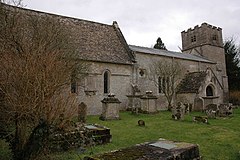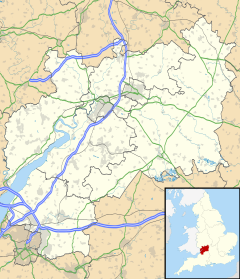Cherington, Gloucestershire
| Cherington | |
|---|---|
 St Nicholas' Church | |
 Cherington Location within Gloucestershire | |
| Population | 224 (2011) |
| District | |
| Shire county | |
| Region | |
| Country | England |
| Sovereign state | United Kingdom |
| Post town | Tetbury |
| Postcode district | GL8 |
| Police | Gloucestershire |
| Fire | Gloucestershire |
| Ambulance | South Western |
| UK Parliament |
|
Cherington is a village and civil parish in the Cotswold District of Gloucestershire, England. The population of the civil parish at the 2011 Census was 224.[1]
St Nicholas' Church[]
The Anglican parish church of St Nicholas is a Grade I listed building.[2] It was founded in the 12th century and had its chancel rebuilt in the mid-13th century. There were other later medieval alterations and two 19th-century restorations, one minor in 1816, and one major in 1881.[2]
Exterior[]
The church is constructed of rubble stone, squared on the tower, and of Cotswold stone. It has a slate roof, except for the nave which has a lead roof. It has a chancel, a nave with a south transept and a north porch, and a west tower. The tower has battlements and is in three stages, stepping in slightly at each offset; there are twin square-headed stone belfry louvres on the top stage. The west side of the tower has three-light ogee windows on the bottom stage and single-light ogee on the middle stage. The early English chancel has three lancet windows, linked by string course, to the north, two to south and two-light Decorated in the corner with transept.[3]
The nave has three-light ogee 19th-century windows, flanking a large gabled porch and a small quatrefoil adjoining chancel to the north side. It has two large Decorated windows, also 19th-century on the south side.
Interior[]
The shallow nave roof was re-pitched in about 1500 and has four bays with chamfered tie-beams and Perpendicular arcading, supported on carved struts on stone corbels. There is early plate tracery in the east window with a small Norman piscina and a 13th-century double piscina above. There is a low wide arch to the south transept with vestiges of mural paintings in reveal of the east window of the transept. There is an 18th-century communion rail and many monuments from the 17th and 18th centuries, particularly wall-mounted in the chancel.[3] There is a 12th-century tympanum above the north doorway.[4]
The church is part of the Avening with Cherington benefice.[5]
History of Cherington Park[]
Earliest records of a manor house in Cherington date back to 1074, owned by Robert D’Oyly, Lord of Wallingford. In 1740 this manor house was replaced with Cherington Park, as it stands today, by John Neale.[6] Neale died in 1749 passing Cherington Park to his son in law, Sir John Turner, 3rd Baronet (MP). By 1766 Turner sold Cherington to Samuel Smith, who passed it on to his son Samuel Smith (MP). The estate was then sold by Samuel Smith’s widow, Mary, to John George.[7] George added Coxes Farm and some glebe land to the estate, passing it to his son, William, in 1824. William George inherited Westrip Farm and Hazleton Farm from his uncle, also William, in 1832. William George left the Cherington Estate to his two grandchildren, Constance and Gertrude who ultimately sold it to Edward S. Tarlton. Edward S. Tarlton, an engineer returning to England having lived in India under colonial rule, bought the Cherington Estate for £15,000 in 1934.[8] Tarlton made many changes to the village including the introduction of running water and electricity. Tarlton died in 1954 dividing the Cherington Estate between his three children; Helen Tarlton, Edward Tarlton and Geoffrey Tarlton. [9]
The Estate[]
The Cherington Estate encompasses the following:
- Cherington House, Coach House, Stables and Park
- Westrip Farm
- Coxes Farm
- Grove Farm
- Summerwell Farm
- Field Farm
- Colly Farm
- Grove Cottages
- Yew Tree Cottages
- Tudor House
- Cherington Village
- Cherington Lake
- Landers Wood
- North Bank Wood
References[]
- ^ "Civil Parish population 2011". Archived from the original on 5 April 2017. Retrieved 4 April 2017.
- ^ a b Stuff, Good. "Church of St Nicholas, Cherington, Gloucestershire". britishlistedbuildings.co.uk. Archived from the original on 10 December 2018. Retrieved 9 December 2018.
- ^ a b Verey, David (1979). Buildings of England: Gloucestershire - The Cotswolds.
- ^ "St Nicolas, Cherington, Gloucestershire · The Corpus of Romanesque Sculpture in Britain & Ireland". www.crsbi.ac.uk. Archived from the original on 10 December 2018. Retrieved 9 December 2018.
- ^ "St Nicholas - A Church Near You". www.achurchnearyou.com. Archived from the original on 10 December 2018. Retrieved 9 December 2018.
- ^ "Cherington Park". National Heritage List for England. Historic England. Retrieved 5 July 2020.
- ^ "Cherington: Introduction Pages 166-168 A History of the County of Gloucester: Volume 11, Bisley and Longtree Hundreds". British History Online. Victoria County History. Archived from the original on 13 April 2015. Retrieved 5 July 2020.
- ^ "Cherington: Manor and other estates Pages 168-170 A History of the County of Gloucester: Volume 11, Bisley and Longtree Hundreds". British History Online. Victoria County History. Archived from the original on 13 June 2017. Retrieved 5 July 2020.
- ^ "Cherington Park Cherington Gloucestershire Archaeological Watching Brief" (PDF). Cotswold Archaeology. Retrieved 5 July 2020.
External links[]
| Wikimedia Commons has media related to Cherington. |
- Villages in Gloucestershire
- Civil parishes in Gloucestershire
- Cotswold District
